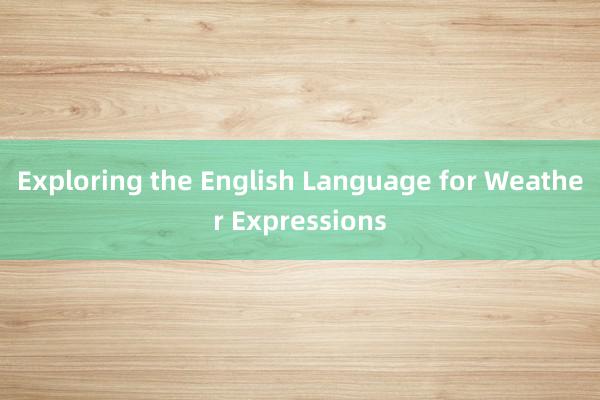
时间:2024-10-20 08:37

### Exploring the English Language for Weather Expressions
The English language is rich and versatile, offering an extensive vocabulary to describe and express various weather conditions. Whether it's sunny skies, gusty winds, or unpredictable storms, the language provides a myriad of expressions that capture the essence of atmospheric phenomena. This article delves into some common and colorful ways the English language describes weather, highlighting its unique ability to convey both the literal and metaphorical aspects of weather patterns.
#### 1. **Sunny Disposition**
"Sunny disposition" isn't just a phrase about the weather; it also describes someone's cheerful and optimistic nature. The connection here is metaphorical, where the warmth and brightness of the sun are used to symbolize a positive outlook on life.
安新县旭琴水生植物种植有限公司#### 2. **Rain Check**
"Rain check" is a playful idiom used when you can't attend an event because of the weather or any other reason,阜阳市众合木业有限公司 suggesting you'll come back another time. It literally refers to waiting for the rain to stop before continuing an outdoor activity but has evolved into a broader context for rescheduling.
#### 3. **Break the Ice**
Although not directly related to weather, 张家港市亿利机械有限公司 "break the ice" is a useful expression that comes from the literal act of breaking ice to allow people to communicate or socialize. In this sense, 原平孚纳旅游集团有限责任公司 it symbolizes overcoming initial barriers to communication or friendship.
#### 4. **Cloud Nine**
"Cloud nine" is an idiom that signifies a state of great happiness or bliss. The term originates from the idea of being high up in the clouds,天津杰锋伟业国际贸易有限公司 suggesting a lofty or idealized state. It's often used to express feelings of extreme joy or satisfaction.
#### 5. **Blow Hot and Cold**
Describing someone who changes their mind frequently or is unreliable, "blow hot and cold" literally means fluctuating between warm and cool temperatures. This metaphor highlights inconsistency and unpredictability.
#### 6. **Under the Weather**
When you're feeling unwell but not necessarily ill enough to seek medical attention, you might say you're "under the weather." The expression links poor health with being under the influence of the elements, such as rain or wind, suggesting a temporary state of discomfort.
#### 7. **Storm in a Teacup**
Used to describe a situation that is blown out of proportion, "storm in a teacup" likens a minor issue to a major disturbance. It suggests that the reaction to the problem is much greater than the problem itself.
#### 8. **Bite the Dust**
Originally referring to the action of a person falling off their horse, "bite the dust" now generally means to fail or be defeated. It's a vivid expression that uses a literal action to convey a figurative outcome, often associated with the intensity of a storm or a fierce competition.
These examples illustrate how the English language uses metaphor and imagery to describe weather conditions beyond their literal meanings. They not only enrich our vocabulary but also add depth and nuance to our conversations天津杰锋伟业国际贸易有限公司, allowing us to express complex emotions and ideas succinctly and vividly.
